
Added By: Administrator
Last Updated: Scott Laz
The Cosmic Puppets
| Author: | Philip K. Dick |
| Publisher: |
Gollancz, 2006 Vintage, 2003 Berkley Books, 1983 |
| Series: | |
|
This book does not appear to be part of a series. If this is incorrect, and you know the name of the series to which it belongs, please let us know. |
|
| Book Type: | Novel |
| Genre: | Fantasy |
| Sub-Genre Tags: | Contemporary Fantasy Weird (Fantasy) |
| Awards: | |
| Lists: | |
| Links: |
|
| Avg Member Rating: |
|
|
|
|
Synopsis
This novel is a revised edition of A Glass of Darkness (1956). It originally appeared in Satellite Science Fiction, December 1956. It was included in Ace Double D-249 (1957).
Yielding to a compulsion he can't explain, Ted Barton interrupts his vacation in order to visit the town of his birth, Millgate, Virginia. But upon entering the sleepy, isolated little hamlet, Ted is distraught to find that the place bears no resemblance to the one he left behind-and never did. He also discovers that in this Millgate Ted Barton died of scarlet fever when he was nine years old. Perhaps even more troubling is the fact that it is literally impossible to escape. Unable to leave, Ted struggles to find the reason for such disturbing incongruities, but before long, he finds himself in the midst of a struggle between good and evil that stretches far beyond the confines of the valley.
Winner of both the Hugo and John W. Campbell awards for best novel, widely regarded as the premiere science fiction writer of his day, and the object of cult-like adoration from his legions of fans, Philip K. Dick has come to be seen in a literary light that defies classification in much the same way as Borges and Calvino. With breathtaking insight, he utilizes vividly unfamiliar worlds to evoke the hauntingly and hilariously familiar in our society and ourselves.
Excerpt
ONE
Peter Trilling watched quietly as the other children played in the dust by the side of the porch. They were intent on their game. Mary was carefully kneading and shaping brown lumps of clay into vague shapes. Noaks sweated furiously to keep up with her. Dave and Walter had already finished theirs and were resting. Abruptly, Mary tossed her black hair, arched her slim body, and set down a clay goat.
'See?' She demanded. 'Where's yours?'
Noaks hung his head; his hands were too slow and clumsy to keep up with the girl's flying fingers. Mary had already swept up her clay goat and was rapidly reshaping it into a horse.
'Look at mine,' Noaks muttered thickly. He stood a clumsily formed airplane on its tail and gave it an accompanying noise with wet lips. 'See? Pretty good, huh?'
Dave snorted. 'That's lousy. Look at this.' He pushed his clay sheep forward, close to Walter's dog.
Peter watched silently. Aloof from the other children, he sat curled up on the bottom step of the porch, arms folded, dark brown eyes liquid and huge. His tousled, sandy-colored hair hung down around his wide forehead. His cheeks were deeply tanned from the hot midsummer sun. He was a small child, thin and long-limbed; his neck was bony and his ears strangely shaped. He said very little; he liked to sit and watch the others.
'What's that?' Noaks demanded.
'A cow.' Mary shaped the legs of her cow and set it on the ground beside Noaks' airplane. Noaks saw it with awe; he drew back unhappily, one hand on his airplane. Then he lifted it up and soared it plaintively.
Doctor Meade and Mrs Trilling came down the stairs of the boarding house together. Peter drew aside, out of the doctor's way; he carefully avoided contact with the blue pin-striped trouser leg, black shiny shoes. 'Okay,' Doctor Meade said briskly to his daughter, as he glanced at his gold pocket watch. 'Time to go back up to Shady House.'
Mary got reluctantly to her feet. 'Can't I stay?'
Doctor Meade put his arm around his daughter affectionately. 'Get going, you little Wanderer. Into the car.' He turned back to Mrs Trilling, again professional. 'There's nothing to worry about. Probably pollen from the broom plants. They're flowering now.'
'Those yellow things?' Mrs Trilling dabbed at her streaming eyes. Her plump face was swollen and red, eyes half-closed. 'They didn't do it last year.'
'Allergies are strange,' Doctor Meade said vaguely. He chewed on the stump of his cigar. 'Mary, I told you to get in the car.' He opened the door and slid in behind the wheel. 'Give me a call, Mrs Trilling, if those antihistamine pills don't do the trick. I'll probably be over tonight for dinner, anyhow.'
Nodding and wiping her eyes, Mrs Trilling disappeared back inside the boarding house, to the hot kitchen and the piles of dishes left over from lunch. Mary moved sullenly toward the station wagon, hands deep in the pockets of her jeans. 'That ruins the game,' she muttered.
Peter slid off his step. 'I'll play,' he said quietly. He picked up Mary's discarded clay and began to reshape it.
Boiling summer sun streamed down on the hilly farms, the acres of wild brush and trees, the jutting cedars and laurels and poplars. And pines, of course. They were leaving Patrick County, getting close to Carroll and the jutting projection of Beamer Knob. The road was in bad repair. The sleek yellow Packard coughed and hesitated as it pushed up the steep Virginia hills.
'Ted, let's go back,' Peggy Barton groaned. 'I've had all I can take.' She hunched over and rummaged for a can of beer behind the seat. The can was warm. She dropped it back in the sack and settled sullenly against the door, beads of perspiration on her cheeks, arms folded furiously.
'Later,' Ted Barton murmured. He had rolled down the window and hung as far out as he could, a rapt, excited look on his face. His wife's voice made no impression on him: his complete attention was on the road ahead, and what lay beyond the next hills. 'Not much farther,' he added, presently.
'You and your damn town!'
'I wonder how it'll look. You know, Peg, it's been eighteen years. I was only nine when my family moved away to Richmond. I wonder if anybody'll remember me. That old teacher, Miss Baines. And the Negro gardener who took care of our place. Doctor Dolan. All kinds of people.'
'Probably dead.' Peg pulled herself up and tugged peevishly at the open collar of her blouse. Her dark hair hung moistly against her neck; drops of perspiration slid down her breasts, over her pale skin. She had taken off her shoes and stockings and rolled up her sleeves. Her skirt was wrinkled and grimy with dust. Flies buzzed around the car; one landed on her gleaming arm and she slapped at it wildly. 'What a hell of a way to spend a vacation! We might as well have stayed in New York and suffered. At least there was something to drink.'
Ahead, the hills rose sharply. The Packard stalled, then pushed on as Barton shifted into low. Immense peaks lifted against the horizon; they were getting near the Appalachians. Barton's eyes were wide with awe as the forests and mountains came nearer, old sights, familiar peaks and valleys and twists he hadn't ever expected to see again.
'Millgate is on the floor of a small valley,' he murmured. 'Mountains on all sides. Only this one road goes in, unless they've built more since I left. It's a small town, honey. Sleepy and ordinary like a hundred other little towns. Two hardware stores, drugstores, blacksmith shop--'
'Any bars? Please say it has a good bar!'
'Not more than a few thousand people. Not many cars come this way. These farms aren't much good, around here. The soil's too rocky. Snows in the winter and gets hot as hell in the summer.'
'No kidding,' Peg muttered. Her flushed cheeks had gone white; she looked greenish around the lips. 'Ted, I think I'm going to be carsick.'
'We'll be there soon,' Barton answered vaguely. He hung farther out the window, craning his neck and trying to make out the scenery ahead. 'By golly, there's that old farmhouse! I remember that. And this cut-off.' He turned from the main road onto a smaller side road. 'It's just over this ridge and then we're there.'
The Packard picked up speed. It raced between dry fields and sagging fences. The road was cracked and weed-covered, broken and in bad repair. Narrow and sharp-turning.
Barton pulled his head inside. 'I knew I'd find my way back here.' He fumbled in his coat pocket and got out his lucky compass. 'It led me back, Peg. My dad gave me this when I was eight. Got it at Berg's Jewelry Store on Central Street. The only jewelry store in Millgate. I can always depend on it. I've carried this little compass around with me, and--'
'I know,' Peg groaned wearily. 'I've heard about it a million times.'
Barton lovingly put the little silver compass away. He gripped the wheel tight and peered ahead, his excitement growing as the car neared Millgate. 'I know every inch of this road. You know, Peg, I remember once--'
'Yes, you remember. My God, I wish you'd forget at least something. I'm so tired of hearing all the details of your childhood, all the lovely facts about Millgate, Virginia--sometimes I just feel like screaming!'
The road plunged around a steep curve, into a thick bank of haze. With his foot on the brake, Barton turned the nose of the Packard down and began to descend.
'There she is,' he said softly. 'Look.'
Below them was a small valley, lost in the blue haze of midday. A stream wound among the dark green, a ribbon of black. Webs of dirt roads. Houses, a cluster in the center. Millgate itself. The massive, somber bowl of mountains that surrounded the valley on all sides. Barton's heart thudded with painful excitement. His town--where he'd been born, raised, spent his childhood. He had never expected to see it again. While he and Peg were vacationing, driving through Baltimore, the idea had suddenly come. A quick cut-off at Richmond. To see it again, see how it had changed...
Millgate loomed ahead. Clumps of dusty brown houses and stores lined the road. Signs. A filling station. Cafes. A couple of road-houses, cars parked in the lots. Golden Glow Beer. The Packard swept past a drugstore, a dingy post office, and abruptly came out in the center of the town.
Side streets. Old houses. Parked cars. Bars and cheap hotels. People moving slowly along. Farmers. White shirts of store owners. A tea room. Furniture store. Two grocery stores. A big market, fruit and vegetables.
Barton slowed down at a traffic light. He turned onto a side street and passed a small grammar school. A few kids were playing basketball on a dusty field. More houses, larger and well built. A fat middle-aged woman in a shapeless dress watering her garden. A team of horses.
'Well?' Peg demanded. 'Say something! How does it look to you?'
Barton didn't answer. He gripped the wheel with one hand; he was leaning out of the window, face blank. At the next cut-off he turned the car to the right and came out again on the highway. A moment later the Packard was moving slowly back among the drugstores, bars, cafes and filling stations. And still Barton hadn't answered.
Peg felt a chill of uneasiness. There was something on her husband's face that frightened her. A look she had never seen before. 'What's wrong?' she demanded. 'Has it all changed? Doesn't it look familiar?'
Barton's lips moved. 'It must be,' he muttered thickly. 'I took the right turn... I remember the ridge and the hills.'
Peg caught his arm. 'Ted, what's wrong?'
Barton's face was waxen. 'I've never seen this town before,' he muttered huskily, almost inaudibly. 'It's completely different.' He turned to his wife, bewildered and scared. 'This isn't the Millgate I remember. This isn't the town I grew up in!'
Copyright © 1983 by Philip K. Dick
Reviews
Images

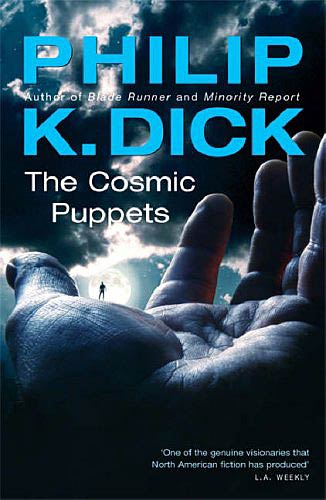
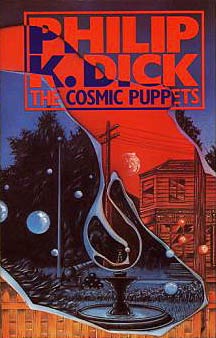
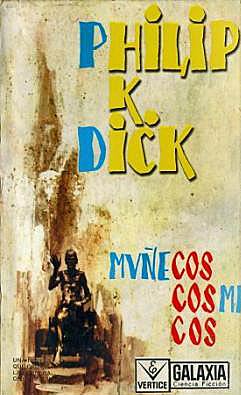
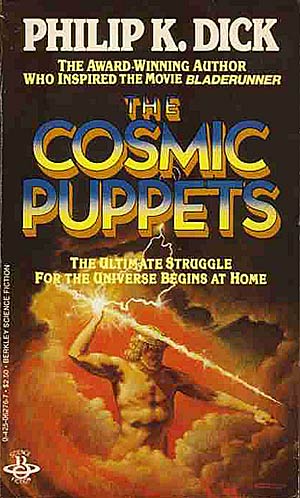
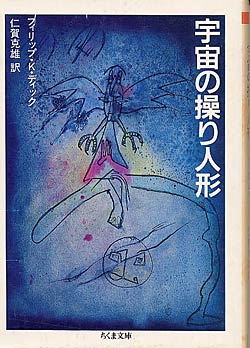
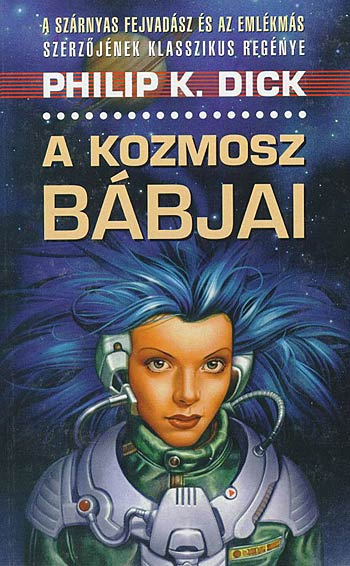

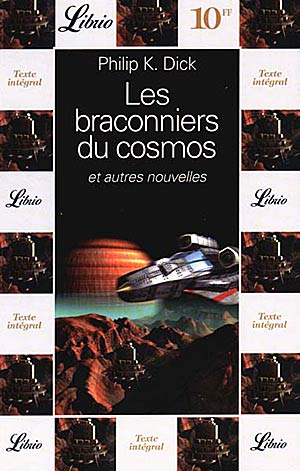
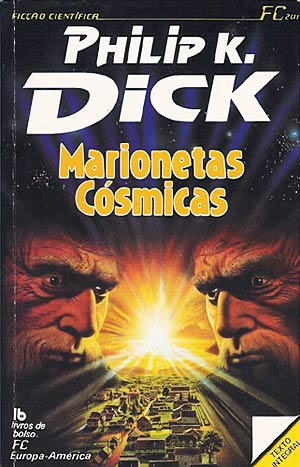
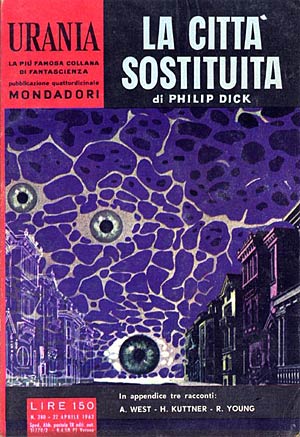





















 Full Details
Full Details





